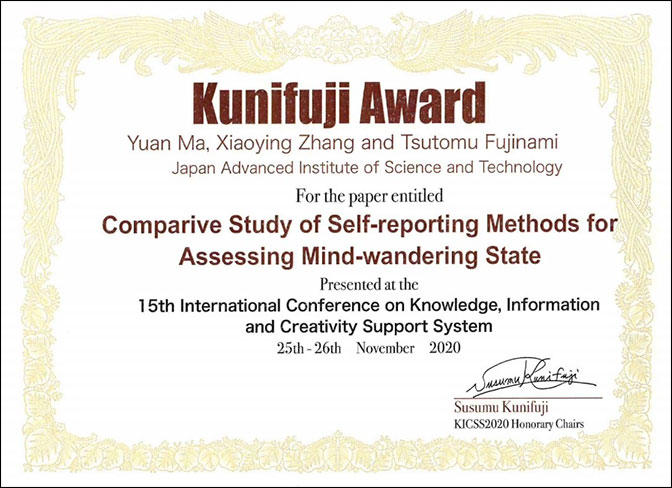Mr. MA received Kunifuji Award in the 15th International Conference on Knowledge, Information and Creativity Support Systems (KICSS 2020).
Mr. MA, Yuan (1st-year doctoral student in Fujinami lab of Human Life Design Area) received Excellent Paper Award in the 15th International Conference on Knowledge, Information and Creativity Support Systems (KICSS 2020).
The 15th International Conference on Knowledge, Information and Creativity Support Systems aims to facilitate technology and knowledge exchange between International researchers/scholars in the field of knowledge science, information systems, and system science and creativity support systems intensively. The conference covers a broad range of research topics in the fields of knowledge engineering and science, information technology, creativity support systems and complex system modeling. The conference has so far been an important event and has attracted many scientists, engineers and researchers from academia, government laboratories, and industry internationally.
This award is nominated and selected based on score of review and quality of presentation in the conference. Innovativeness in knowledge management and creativity science is evaluated in the contents of research.
KICSS 2020 was held at online during November 25-26, 2020.
■Date Awarded
November 26, 2020
■Title
Comparive Study of Self-reporting Methods for Assessing Mind-wandering State
■Authors
Yuan Ma, Xiaoying Zhang, Tsutomu Fujinami
■Abstract
Mind-wandering can be considered as a daydream-like state induced while working on cognitive tasks. Currently, mind wandering is investigated by abruptly presenting questions to participants for asking them to report their mental states.
However, a related work indicates that the popped-up questions may leave a negative impact on the cognitive performance of participants. It may also suppress the mind-wandering occurrences.
We assume that there may be two factors that cause such negative influences on participants. The first is unpredictability of popping up questions. The second is the frequency in which such a question is shown.
In this study, we discuss the former factor by employing a within-subjects experiment, namely, inviting participants to see those questions either unpredictably or with their own intents.
We analyzed both subjective reports and objective performances by participants to find that unpredictable questions hardly leave an impact on them while they are in the state of mind wandering.
■Comment
I am thankful so much for having this opportunity to receive Kunifuji Award. It is really a great honor for us that our work can be considered by KICSS 2020 conference for this award.
I would like to take this opportunity to thank my supervisor, Fujinami sensei, for continually supporting me in working on this direction. Also, we appreciate the JAIST Research Grants (Houga) very much for financially funding our project. Then, I appreciate my college and laboratory mate, Ms.Xiaoying Zhang, for her kind help. Finally, I would like to thank all the participants there and share the pleasure and honor of receiving this award with them, for I have learned so many wonderful presentations in this wonderful event.
Our work is about to find out the most effective way to study the mind-wandering phenomena, which is a specific cognitive state associated with creativity. We hope that our work will finally benefit the studies in the areas that closely related to creation.
Thank you.
February 5, 2021
